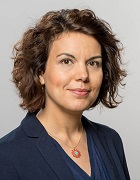
Prof. Dr. Danny Nedialkova
Professur
Kontakt
Wissenschaftliche Laufbahn und Forschungsgebiete
Proteine sind die wesentlichen Effektoren biologischer Funktionen, daher ist ihre zeitlich regulierte und korrekte Synthese von höchster Bedeutung für die zelluläre Homöostase. Prof. Nedialkova (*1983) forscht mit systembiologischen Ansätzen wie die Mechanismen der Proteinsynthese und der Faltung in verschiedenen Zelltypen zusammenwirken, und wie diese Synergie in Krankheiten gestört ist.
Prof. Nedialkova studierte Biotechnologie an der Universität von Perugia in Italien, und promovierte in Molekulare Virologie an der Universität Leiden in den Niederlanden. Danach war sie am Max-Planck-Institut für molekulare Biomedizin in Münster als Postdoc tätig, mit einem Stipendium von der European Molecular Biology Organisation. Seit 2017 leitet sie die Max-Planck-Forschungsgruppe “Mechanismen der Proteinbiogenese” am Max-Planck-Institut für Biochemie in Martinsried. 2017 folgte sie durch das Programm MaxPlanck@TUM einem Ruf als Tenure-Track Professorin für Biochemistry of Gene Expression an die TUM.
Wichtigste Auszeichnungen
- EMBO Young Investigator Award (2021)
- ERC Starting Grant (2018)
- EMBO Long-Term Postdoctoral Fellowship (2010)
Schlüsselpublikationen (alle Publikationen)
Reimão-Pinto M.M. , Behrens A., Forcelloni S., Fröhlich K., Kaya S., Nedialkova D.D. “The dynamics and functional impact of tRNA repertoires during early embryogenesis in zebrafish.” EMBO J 2024; 43: 5747 – 5779.
AbstractGao L.*, Behrens A.*, Rodschinka G., Forcelloni S., Wani S., Strasser K., Nedialkova D.D.: “Selective gene expression maintains human tRNA anticodon pools during differentiation.” Nature Cell Biology 2024; 26:100-112.
AbstractBehrens A., Rodschinka G., Nedialkova D.D.: "High-resolution quantitative profiling of tRNA abundance and modification status in eukaryotes by mim-tRNAseq". Molecular Cell. 2021; doi: 10.1016/j.molcel.2021.01.028.
AbstractNedialkova DD, Leidel SA: "Optimization of codon translation rates via tRNA modifications maintains proteome integrity". Cell. 2015; 161(7): 1606-1618.
AbstractLaguesse S, Creppe C, Nedialkova DD, Prévot P-P, Borgs L, Huysseune S, Franco B, Duysens G, Krusy N, Lee G, Thelen N, Thiry M, Close P, Chariot A, Malgrange B, Leidel SA, Godin JD, Nguyen L: "A dynamic unfolded protein response contributes to the control of cortical neurogenesis". Developmental Cell. 2015; 35(5): 553-567.
AbstractBei Änderungs- oder Aktualisierungswünschen wenden Sie sich bitte an Franz Langer.